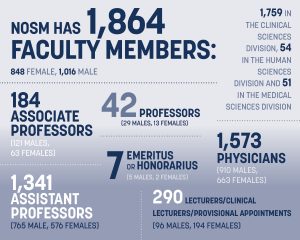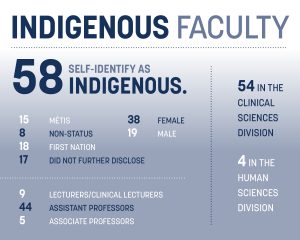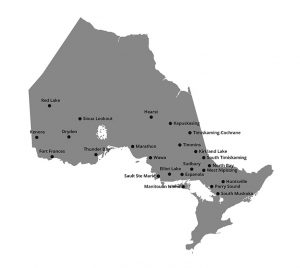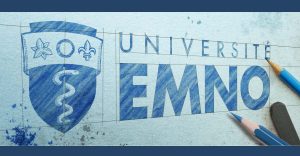The doctor is in. And in. And in.
Posted on November 2, 2021
In an unprecedented commitment to health care in Northern Ontario, the Ontario Medical Association (OMA) was in Sudbury last week for the launch of their Northern health-care recommendations. In developing the OMA’s Prescription for Northern Ontario, more than 1,600 physicians and physician leaders provided input. The current health-care system is plagued by physician shortages; long wait times; a serious backlog of services; inadequate mental health and addiction programs; and, insufficient home and community care, among other problems.
Nowhere are the issues more critical. Equitable access to health care in Northern Ontario is a unique challenge, requiring unique solutions. The Northern plan of action is part of a larger master plan, Prescription for Ontario: Doctors’ 5-Point Plan for Better Health Care, which provides 75 province-wide recommendations for implementation over the next four years. A result of the largest consultation in the OMA’s 140-year history, the plan also has a dedicated website.
NOSM’s 1,759 clinical teachers—physicians and health-care professionals across Northern Ontario—are a critical part of this OMA consultation. They are passionate about helping patients, and that’s often translated into their advocacy work and championing equitable access to care. Clinical teachers are playing an invaluable role in the future of NOSM’s evolution into Canada’s first medical university.
Who are NOSM’s clinical teachers?
A clinical teacher is a unique type of teacher. In addition to imparting knowledge of medical science through the curriculum, clinical teachers demonstrate communication skills, how to care for patients and they are a role model and colleague to their students. In recent years, attention has been drawn to integrated teaching, problem-based learning, and new methods of assessment. There is also an emphasis on a positive learning environment, competency-based assessment and evolving standards of accreditation. In this time of COVID-19 and rapid technological change, the role of clinical teachers has become ever more important.
What makes a great clinical teacher?
In a distributed, community-engaged learning model such as NOSM, physicians and health-care professionals perform numerous activities while managing complex demands on their practice. While striving for a high degree of clinical excellence, clinical teachers develop new expertise, master new techniques, and integrate innovative approaches to patient care. Clinical faculty teach in a variety of health programs in clinics, hospitals, and the classroom.
By engaging in vital health research, clinical faculty are seeking solutions to care for the people of Northern Ontario.NOSM faculty members—physicians and health professionals—are heavily involved in developing and refining program curriculum so that graduates continue to meet the ever-evolving needs of their patients. As clinical teachers they play a key advocacy role for their patients and students, from local to national levels. Advocacy involves taking leadership roles, volunteering, leading new initiatives, or lobbying government for health-related issues.
Who are the teachers at NOSM?
As of October 22, 2021.



Funding clinical teachers
On April 1, 2009, the NOSM Alternative Funding Plan (AFP), a contractual agreement between the Physician Clinical Teachers’ Association (PCTA), Ontario Medical Association (OMA), Ministry of Health and Long-Term Care (MOHLTC), and NOSM was signed. The agreement provides funding that recognizes the unique contributions of clinical physicians for academic activities at NOSM. NOAMA is an unincorporated association established to manage, distribute, and administer the AFP on behalf of the MOHLTC and the members in accordance with the contractual terms of the AFP Agreement. The PCTA holds the majority of the voting membership of NOAMA.
The NOAMA AFP is intended to increase the capacity of physicians to provide clinical services and academic activities in an integrated manner. To foster this culture, Local Education Groups (LEG) have been set up across Northern Ontario. A LEG is a group of physician clinical faculty who assume responsibility for the provision of significant, identifiable component(s) of NOSM’s current academic mandate.
The NOAMA Board distributes funds for scholarly activities through a LEG funding formula. An accountability framework has been established to capture the academic activities occurring across Northern Ontario. This structure assists NOAMA in developing coalitions with the capability to drive positive changes in health care.
To date, 52 LEGs have been implemented in Northern Ontario.

The accomplishments of the LEGs are incredible in such a short life at NOSM. Here is a snapshot of what they have contributed to NOSM in clinical teaching.
Rotation Weeks

The clinical teachers at NOSM, NOAMA, the PCTA and the LEGs all converge to provide the School with the finest and the most conscientious leaders and educators in Canada. They know that the development of students’ clinical competence is driven by the volume and variety in their learning, the influences of an authentic clinical settings, self-directed learning, and establishing a safe and supportive environment. NOSM’s clinical teachers are key to transforming learners into much-needed future practitioners who are compassionate, competent, and patient-centered.
On behalf of NOSM, thank you! I am looking forward to the meeting of LEG leads and administrators on November 5.
‘The mediocre teacher tells. The good teacher explains.
The superior teacher demonstrates. The great teacher inspires.’’
— William Arthur Ward
Are you a clinical teacher at NOSM? Do you have a story to share?
Do you want to become a clinical teacher? Here is how you can apply to become a faculty member!
Does your group want to become a LEG? Here is where you can apply.
Sad News
The Northern Ontario School of Medicine is saddened by the recent loss of two NOSM faculty members.
Dr. Janet McElhaney, NOSM Professor and accomplished Sudbury geriatrician, completed her medical degree at the University of Alberta’s Faculty of Medicine. Dr. McElhaney can be credited with a number of accomplishments over the course of her practise and research, including her recent receipt of the annual Jonas Salk Award.
Dr. Annabella Zawada, faculty member, completed her medical degree at the University of Toronto followed by a family medicine residency at McMaster University. She practiced as a family physician in Terrace Bay for a number of years before relocating to Thunder Bay to open the Umbrella Medical Clinic.
Our deepest condolences go out to the families of Drs. McElhaney and Zawada.
COVID Update
The Northern Ontario School of Medicine continues to take proactive steps to ensure the safety and wellbeing of its learners, staff, faculty and visitors who attend NOSM campus buildings in Sudbury and Thunder Bay. To help ensure a safe learning and work environment, NOSM has established a Vaccine Policy that will take effect immediately.
As part of this policy, all individuals who access NOSM campus facilities (in Sudbury and Thunder Bay) are required to be fully vaccinated against COVID-19. For those who are unvaccinated, and are required to be on campus, will be required to undergo regular testing for COVID-19 and provide a negative test in order to access campus.
Please refer to the appropriate policy for additional details:

Thank You!
More than 900 individuals have been engaged through the NOSM University presentations taking place across Northern Ontario. Your commitment to the betterment of the health of Northern Ontarians is inspiring. Upcoming town halls will be at:
TONIGHT: Sudbury | Tuesday, November 2, 2021 | 5:30 p.m. EDT
North Bay | Monday, November 8, 2021 | 5:30 p.m. EST
Timmins | Wednesday, November 10, 2021 | 5:30 p.m. EST
Sault Ste. Marie | Friday, November 12, 2021 | 5:30 p.m. EST
Rosseau (Parry Sound-Muskoka) | Tuesday, November 16, 2021 | 5:30 p.m. EST
Your input is critical. Please take a few minutes to complete the consultation survey and learn more about our commitment to Northern Ontario in the Dean’s recent report, Transformation.

